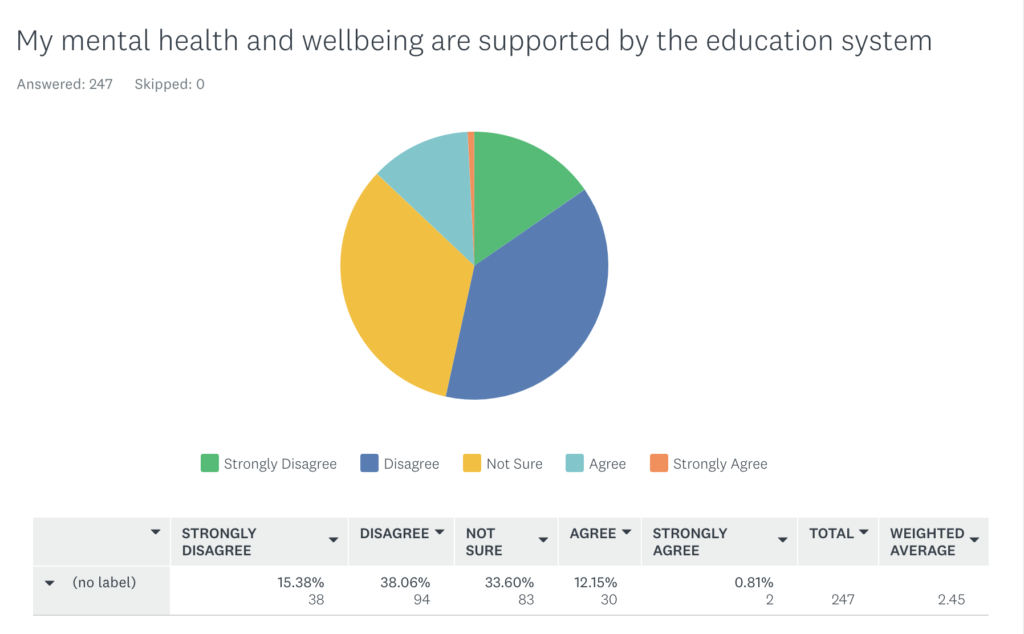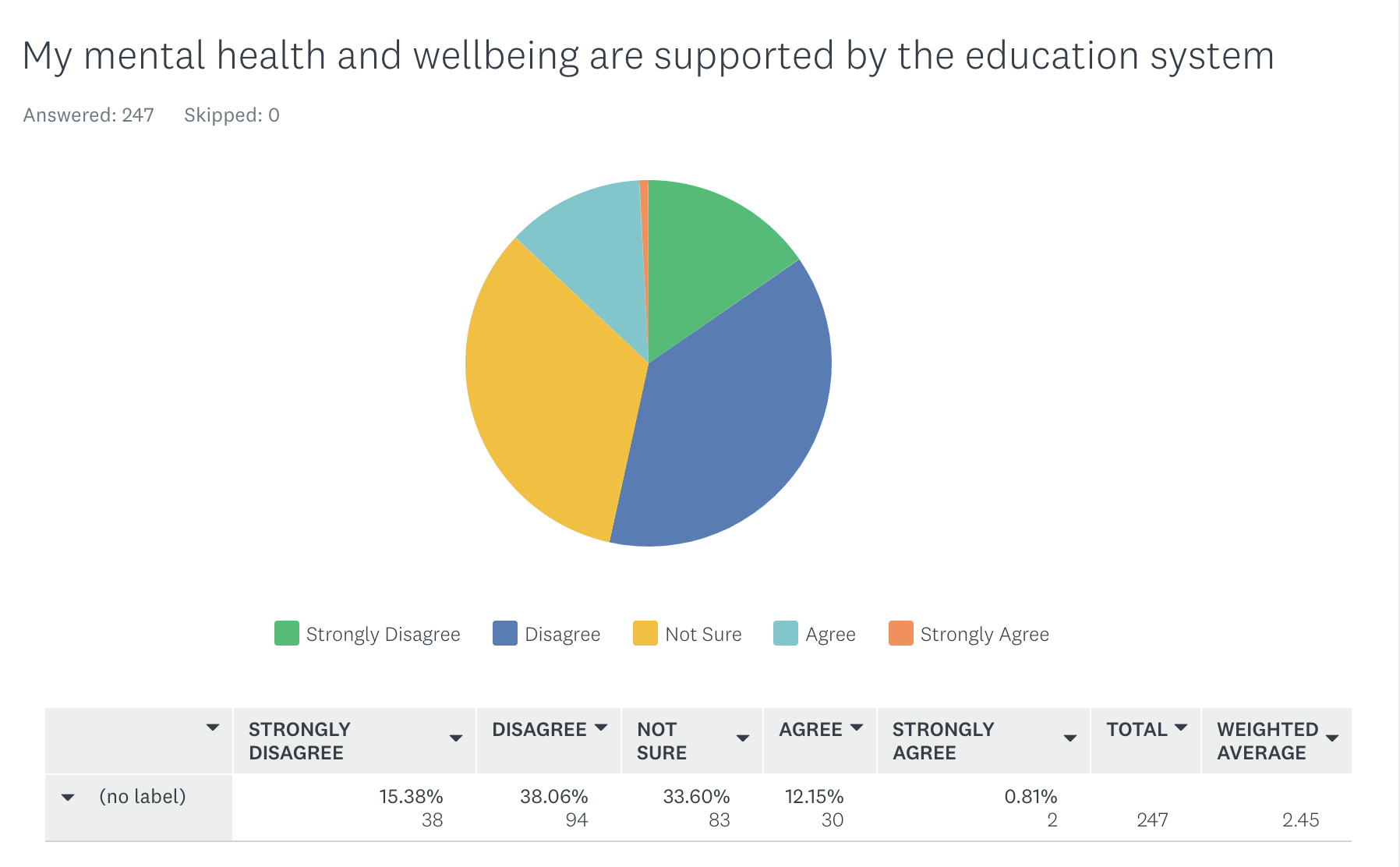The impact of school on young people’s mental health: a UCL doctoral student shares his findings, by States of Mind

With our youth-led research project, Breaking The Silence, we’re exploring the impact of the UK’s educational system on young people’s mental health and wellbeing. Today we hear from Jaspar Khawaja, a doctoral student at the UCL Institute of Education, who has been collaborating with us in recent months to develop the research.
Asked about the impact of school on students’ mental health, a school student responded:
“Higher stress levels, anxiety, depression, fear, isolation.”
This is just one of many eye-opening responses from our recent student-led study, which gathered young peoples’ views about the impact of the education system on their mental health and wellbeing.
In my first year as a doctoral student at the Institute of Education, UCL, I undertook a research project in collaboration with States of Mind. I had previously worked in a secondary school with young people who had experienced trauma, and observed how the education and health services attempted to support them. Often, this involved diagnosing them with Attention Deficit Hyperactivity Disorder (ADHD) and prescribing medication, with less focus on trying to understand their perspectives and experiences. I also worked in a Child and Adolescent Mental Health Service (CAMHS) inpatient unit for adolescents with mental health problems. Over time I began to notice how many of the young people would be considered ‘well enough’ to leave the unit but would be readmitted to the unit after a few months as their problems worsened again. This indicated to me that something bigger must be going on in the lives of young people that is currently being missed, particularly in education and mental health services, and that the current approaches are potentially too limited or just not working.
Evidence suggests that mental health problems are on the rise for young people in the UK with depression, anxiety and suicide rates all increasing. A wealth of evidence already shows us that high stakes exams can directly negatively impact upon the mental health of young people. One way the government has responded to the mental health issues suffered by young people is to trial the use of mental health support teams (MHSTs) in schools, the aim being to provide early intervention to children and young people with mental health issues. Doubtless, MHSTs will have a positive impact on some young people. However, evidence suggests that without consideration of prevention, these policies will do little to resolve the growing mental health crisis.
The crucial, unacknowledged question is:
What impact does the education system have on the mental health and wellbeing of young people?
At States of Mind, we believe that understanding the causes of psychological distress, rather than treating their symptoms, requires a greater understanding of young people’s perspectives and allows solutions to be raised.
Breaking The Silence
Previously, using a Participatory Action Research (PAR) approach , nine students at a London school analysed the themes gathered in a previous student project, which resulted in a letter being written to Ofsted. The students considered ways these themes could be further explored. In the current study, a different group of student researchers designed a two-part questionnaire to gather a wider sample of students’ views, containing both closed and open questions. The questionnaire aimed to explore students’ views on exams and mental well-being in the education system. Additionally, after it was introduced to the Ofsted inspection handbook, the student researchers wanted to ask other young people how they would define “personal development”. The questionnaire was answered by 247 students at a different London school aged 16-18.
What Did We Find?
Only 12.96% of participants responded that their mental health was supported by the education system, raising massive questions about the impact of the education system on the wellbeing of young people. 38.06% disagreed with the statement, while 15.38% strongly disagreed.

We also found as little as 17.41% thought exams prepare students well for life. 53.16% of students either disagreed or strongly disagreed with the statement, while 19.43% said they were not sure. This brings into question what the purpose of exams actually is, if not to prepare young people for future life.
Just 18.29% of students thought the education system supported the individual needs of students with the majority (59.75%) disagreeing or strongly disagreeing with the statement.
We also reviewed the open question answers. Here, students were able to elaborate more as to their thoughts in response to the questions above. The core themes that emerged are best summarised as follows:
“Exams cause overwhelming and unnecessary amounts of stress” and “Exams are a poor measure of students ability”
The students reported that the experience of school can “hugely worsen” the mental health of young people. They asserted that for some young people, aspects of the education system are the “sole reason for the deterioration” of their mental health. Reasons provided for this were the belief that high stakes examinations “dictate their future success”. For many students the “anxiety” and “stress” can become all-consuming. Many participants indicated that focus on exams meant they had no time to “do anything else” and this particularly “isolates some people who aren’t good at memorising facts but are still talented in their own right”.
Students also commonly expressed how “the school acts as a grade factory and all they focus on is statistics in terms of grades, attainment and awards”. The focus on attainment “creates an environment of competition” and “limits creativity in the sense that it teaches students to do things in a set way to get higher marks in exams.” Participants expressed anger that “everything seems to come back to exams rather than learning what you enjoy for the fun of it.”
There was a lack of consistency amongst answers to “What does personal development mean to you?” demonstrating the complexity of the term. A recurring answer was “growth as a person”.
The students discussed the importance of “developing into the person that you wish to be” and the need to “discover what you actually believe” and what “makes you different from others”. “Happiness, confidence, kindness and resilience” were viewed as key emotions and characteristics of personal development, with the opportunity to learn both “social skills and life skills” essential in producing them. Some participants also considered personal development to be “learning about issues in society”.
What Does This Mean?
Whilst of course limited by sample size, this research provides some insight into why many English children repeatedly state that they are unhappy with their school experiences. The exam system was particularly highlighted as an issue which should not be ignored by policy makers. Despite young peoples’ mental health gaining more attention in recent times the government continues to ignore the idea that the education system is contributing towards this. The UN Convention on human rights explicitly states that children have the right to participate in decision-making about their lives. At States of Mind we acknowledge that educational practices have a large impact on children and young peoples’ health and wellbeing. They have the right to contribute to the policies that shape their lives.
We are continuing to develop the Breaking The Silence project in collaboration with UCL Institute of Education. The next stage will see us work with a group of students to reimagine educational assessment. Stay tuned.

